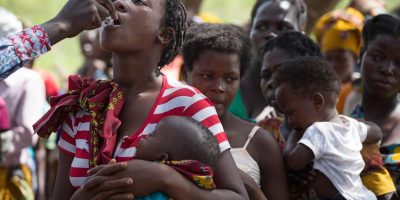Search
Search within Malaria
19 results found
Briefing
Information Preparedness and Community Engagement for El Niño in the Eastern and Southern Africa Region frptes
El Niño can be viewed as a multi-hazard event, and considerations for information needs cut across different populations and risks, including direct weather-related hazards, reduced agricultural production, greater food insecurity and malnutrition, increased transmission of infectious diseases and effects on…
Research paper
Traditional healers in Nigeria: perception of cause, treatment and referral practices for severe malaria.
Malaria remains one of the main causes of mortality among young children in sub-Saharan Africa. In Nigeria traditional healers play an important role in health care delivery and the majority of the population depend on them for most of their…
Caregivers’ perception of risk for malaria, helminth infection and malaria-helminth co-infection among children living in urban and rural settings of Senegal: A qualitative study.
The parasites causing malaria, soil-transmitted helminthiasis and schistosomiasis frequently co-exist in children living in low-and middle-income countries, where existing vertical control programmes for the control of these diseases are not operating at optimal levels. This gap necessitates the development and…
Research paper
Treatment-seeking and uptake of malaria prevention strategies among pregnant women and caregivers of children under-five years during COVID-19 pandemic in rural communities in South West Uganda: a qualitative study
Despite efforts to avert the negative effects of malaria, there remain barriers to the uptake of prevention measures, hindering its eradication. This qualitative case study explored factors influencing uptake of malaria prevention strategies among pregnant women and children under-five years…
Research paper
The social dimensions of community delivery of intermittent preventive treatment of malaria in pregnancy in Madagascar, Mozambique, Nigeria and the Democratic Republic of the Congo
Intermittent preventive treatment in pregnancy with is a key malaria prevention strategy. We conducted an anthropological study to understand the social context of a community based approach to delivering sulphadoxine pyrimethamine (C-IPTp) through community health workers (CHWs) in four countries…
Research paper
Introducing rapid diagnostic tests for malaria into registered drug shops in Uganda: lessons learned and policy implications
Malaria is a major public health problem in Uganda. Current policy recommends introduction of rapid diagnostic tests (RDTs) to facilitate effective case management. However, provision of RDTs in drug shops raises new issues, such as adherence to RDTs results, management…
Research paper
Introducing malaria rapid diagnostic tests at registered drug shops in Uganda: Limitations of diagnostic testing in the reality of diagnosis
In Uganda, around two thirds of medicines are procured from the private sector, mostly from drug shops. The introduction of malaria rapid diagnostic tests (RDTs) at drug shops therefore has the potential to make a significant contribution to targeting antimalarial…
Research paper
‘It puts life in us and we feel big’: shifts in the local health care system during the introduction of rapid diagnostic tests for malaria into drug shops in Uganda
This paper is an analysis of the social interaction between drug sellers, their clients and local health care workers within a medical trial that introduced rapid diagnostic tests for malaria into private sector drug shops in Mukono District, Uganda. It…
Research paper
Challenging logics of complex intervention trials: community perspectives of a health care improvement intervention in rural Uganda
Health systems in many African countries are failing to provide populations with access to good quality health care. The PRIME trial in Tororo, rural Uganda, designed and tested an intervention to improve care at health centres, with the aim of…
Research paper
“There are many fevers”: Communities’ perception and management of Febrile illness and its relationship with human animal interactions in South-Western Uganda
Diagnosing the causative agent of febrile illness in resource-limited countries is a challenge in part due to lack of adequate diagnostic infrastructure to confirm cause of infection. Most febrile illnesses (>60%) are non-malarial, with a significant proportion being zoonotic and…
Research paper
“There are many fevers”: Communities’ perception and management of Febrile illness and its relationship with human animal interactions in South-Western Uganda
We conducted a focused ethnographic study in Western Uganda among communities with high human livestock interaction to describe communities’ behaviors, exposures, and attitudes toward fever. Perceptions of illness and associated risk factors were heavily influenced by predominant livelihood activities. As…

Evidence review
Health-Seeking Behaviours in Sofala and Manica in Relation to Cyclone Idai Response
Rapid review question: What are the health-seeking and nutritional practices of the affected populations? How do they frame, understand and engage in prevention of cholera/AWD, malaria, measles/rubella (or vaccine preventable diseases); infant and child feeding and other relevant diseases? What…


